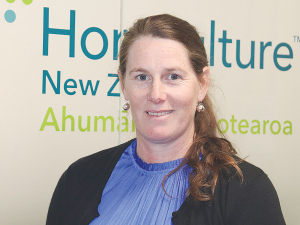Primary sector leaders praise speed and ambition of India–NZ free trade deal
Primary sector leaders have praised the government and its officials for putting the Indian free trade deal together in just nine months.
 New chief executive of Horticulture NZ, Kate Scott says she’s energised and keen to contribute to the broader primary sector.
New chief executive of Horticulture NZ, Kate Scott says she’s energised and keen to contribute to the broader primary sector.
After spending 20 years running her own successful environmental consultancy in Central Otago, Kate Scott is ready for a new challenge.
The new chief executive of Horticulture NZ (HortNZ) told Rural News that she’s energised and keen to contribute to the broader primary sector rather than just at a regional level which is what she was doing.
“As a collaborative person I come into the role to bring people together not just horticulture but also the broader sector,” says Scott.
“The fact is that I have really diverse range of experience and knowledge - not just horticulture but also dairy, sheep and viticulture,” she says.
The shape of the whole primary sector is changing with a decline of smaller operators and the emergence of family corporates and larger entities. Horticulture is no different, says Scott.
“There are a number of small family businesses that have been an integral part of the sector in the last 100 years or more; we need to make sure that we support them as well as the larger entities,” she says.
Scott says the demands of the larger scale businesses are different to the small ones and the challenge for HortNZ is having the skills to navigate that spectrum. She says in her previous role she has done just that.
“At the end of the day we are there for all the growers and the challenge is meeting their respective needs,” she says.
The debate around land use has been going on for many years. The horticulture sector has been fighting an ongoing battle with local authorities to preserve highly productive land being lost forever to urban sprawl. Scott says this is one of the biggest issues that she’s had to deal with over the past 20-plus years.
She says it’s a case of finding a balance of what is good for the environment and good for the people and says that taking a binary of view of right or wrong is not always the best.
“I would like to say that horticulture is part of the solution to land use change and diversification.
“Like any land use we have to question where and how we do things and in order for us to flourish we need to actually take a holistic approach, because of the interconnected nature of all these challenges,” she says.
Scott notes that there are very positive things happening in the sector. This includes it being a record year for kiwifruit, and cherries down south looking good provided the rain holds off. But she warns that vegetable growers are facing challenges around being able to grow in a way that they aren’t tripped up by regulation.
“I think that is a particular [issue] for vegetable growers about how they balance the needs of our community around accessing fresh vegetables but in a way that enables them to do that well,” she says.
In recent months some large commercial growers say the way the regulations are being implemented will likely force them out of business and Kate Scott says there needs to be a ‘common sense’ approach to regulations.
The World Wide Sires National All Day Breeds Best Youth Camp Best All Rounder plaudit has become family affair, with 2026 Paramount Cup winner Holly Williams following in her sister Zara's footsteps.
DairyNZ is giving New Zealand farmers a unique opportunity to gain hands-on governance and leadership experience within the dairy sector.
Herd improvement company LIC has posted a 5.2% lift in half-year revenue, thanks to increasing demand for genetics.
According to the latest Fresh Produce Trend Report from United Fresh, 2026 will be a year where fruit and vegetables are shaped by cost pressures, rapid digital adoption, and a renewed focus on wellbeing at home.
The Roar is a highlight of the game hunting calendar in New Zealand, with thousands of hunters set to head for the hills to hunt male stags during March and April.
OPINION: The past few weeks have been tough on farms across the North Island: floods and storms have caused damage and disruption to families and businesses.